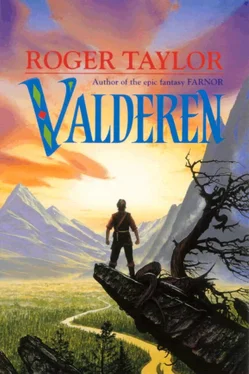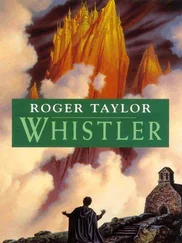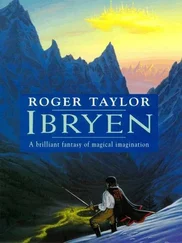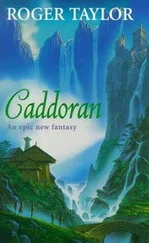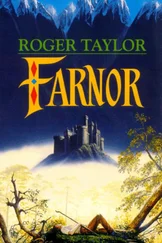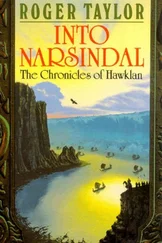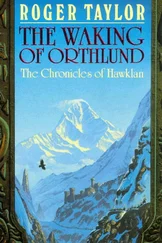Roger Taylor - Valderen
Здесь есть возможность читать онлайн «Roger Taylor - Valderen» весь текст электронной книги совершенно бесплатно (целиком полную версию без сокращений). В некоторых случаях можно слушать аудио, скачать через торрент в формате fb2 и присутствует краткое содержание. Жанр: Фэнтези, на английском языке. Описание произведения, (предисловие) а так же отзывы посетителей доступны на портале библиотеки ЛибКат.
- Название:Valderen
- Автор:
- Жанр:
- Год:неизвестен
- ISBN:нет данных
- Рейтинг книги:3 / 5. Голосов: 1
-
Избранное:Добавить в избранное
- Отзывы:
-
Ваша оценка:
- 60
- 1
- 2
- 3
- 4
- 5
Valderen: краткое содержание, описание и аннотация
Предлагаем к чтению аннотацию, описание, краткое содержание или предисловие (зависит от того, что написал сам автор книги «Valderen»). Если вы не нашли необходимую информацию о книге — напишите в комментариях, мы постараемся отыскать её.
Valderen — читать онлайн бесплатно полную книгу (весь текст) целиком
Ниже представлен текст книги, разбитый по страницам. Система сохранения места последней прочитанной страницы, позволяет с удобством читать онлайн бесплатно книгу «Valderen», без необходимости каждый раз заново искать на чём Вы остановились. Поставьте закладку, и сможете в любой момент перейти на страницу, на которой закончили чтение.
Интервал:
Закладка:
Roger Taylor
Valderen
Chapter 1
The castle gates swung open.
Nilsson turned to watch the swaying silhouette that was moving slowly through the shade of the archway. He had been assiduously resurrecting the old, long-forgotten habits that had, in the past, ensured both his survival and his advancement, though it took him some effort to keep his demeanour neutral as Rannick, astride his foul-tempered mount, emerged into the light. For while Rannick might not yet be the man that Nilsson’s erstwhile master had been, his power was increasing almost daily and, as it grew, so his humanity inevitably diminished. Nilsson knew only too well that now he had chosen to stand by his new Lord his life depended solely on the value that Rannick placed on him, and that this value depended in turn not only on his willingness to serve but on his ability to read and anticipate Rannick’s moods accurately.
And it was especially important now, for he was certain that something had gone amiss during the fiery demonstration that Rannick had given the previous day. True, the roaring column of fire that had appeared out of nothingness had been both awe-inspiring and terrifying, and it had sent Gryss and the others away suitably cowed and humiliated. Yet, increasingly sensitive to his master’s behaviour, Nilsson was sure that he had felt Rannick falter. Only slightly, admittedly, but the memory of it had lingered with him since. It was as if Rannick had been assailed in some way. And he had sensed, too, a grim, almost desperate, anger begin to mount in the man; an anger that had seemed to be building towards some appalling conclusion until it had suddenly evaporated into a surprised vagueness at the unexpected collapse of Gryss and the others on to their knees.
Rannick had stood for a long time apparently star-ing after the retreating figures as they stumbled away from the castle, supporting the beaten Farnor. But Nilsson, fearfully willing himself to absolute stillness lest he inadvertently attract Rannick’s attention, saw that his eyes were abstracted and distant.
Then, as if in confirmation of Nilsson’s conclusion, Rannick had silently beckoned for his horse and, without comment, ridden north.
Later, Nilsson had started violently from a troubled sleep to hear, he thought, the distant shrieking howl of Rannick’s creature. Though whether it had been reality or a lingering remnant of some nightmare, he could not have said.
And now Rannick had returned.
Nilsson took a slow, silent, very deep breath as Ran-nick came to a halt in front of him. ‘Lord,’ he said, bowing slightly.
‘We begin today,’ Rannick replied tersely as he dis-mounted.
‘Lord?’
But Rannick was walking away from him. Hastily Nilsson turned and strode after him across the court-yard. What had he missed? As they reached a doorway, Rannick turned and looked squarely at him. ‘We begin our conquest of this land, Captain,’ he said. ‘I am fully ready now. All opposition has been ended.’
Opposition? There was more in Rannick’s tone than a reference to the mere quelling of Gryss and the others. So something had happened yesterday. Yet too, there was a strange exhilaration about Rannick that Nilsson had not known before. Something else must have happened during the night: something profound. He asked no questions, however. Time, and silent, watchful awareness, would eventually give him such answers as he needed. Petty curiosity now might well kill him. ‘As you command, Lord,’ he replied, as Rannick turned and disappeared into the building.
Thus Rannick’s early cautious steps along what he knew as the golden road of his destiny became a purposeful and determined march. Having finally had his own way in the matter of the treatment of the villagers, Rannick seemed content now to leave the day-to-day pursuit of his schemes in Nilsson’s hands and, beyond a general overseeing of matters, he interfered scarcely at all with detailed plans. Nilsson however, took few chances, and submitted almost his every intention and the reasons for it to Rannick for his approval. Increasingly he was finding Rannick difficult to anticipate.
Rannick, though, was learning. Learning more and more about the nature of the men that he now com-manded, not least about their peculiar, savage expertise and how it could best be used to further his ends. Yet he knew that to speak openly on such matters would be merely to display his ignorance and, in so doing, diminish his authority.
Fascinating though this learning was however, it was secondary to his avid study of his growing power and the mastering of the subtleties of its use. For hour upon hour he secluded himself in a room at the top of the castle’s highest tower, a room which overlooked the woods and peaks to the north as well as the sweep of the valley southwards. No one knew what arts he practised there but, although nothing had been said, it was acknowledged that the room was forbidden to all others, on pain of immediate death. And the light that flickered fitfully from its windows at night was like a baleful eye, surveying not only the castle yards but the entire valley. More than a few of Nilsson’s men complained that they could feel it watching them even when they were indoors. ‘Well, be careful what you say and do, then,’ he offered them, by way of reassurance. ‘And what you think.’
And too, unannounced, Rannick would take his evil-tempered horse and ride off to the north. Sometimes he would return the same day. Sometimes he would be gone for several days. These mysterious absences unsettled Nilsson badly, particularly the longer ones. They brought to his mind the spectre of his new Lord not returning, either through some unforeseen hazard or, worse, through choice. But he could say nothing. As he had many years before, he could only have faith in the path that he had chosen, accepting the arbitrary behaviour of his Lord and continuing with the task that had been placed in his hands: the conquest of the land.
Only a few weeks ago such a notion would have seemed absurd to him. Indeed, but weeks ago, it would have been absurd. Then, he and his men had been a haunted and broken force. But, no longer. Now they had been renewed. Now their every ambition could be fulfilled, with time, patience and careful planning. Despite the dark uncertainty of Rannick’s leadership, the prospect exhilarated Nilsson, though he allowed no outward sign of this to show.
Such knowledge as he had gained while journeying through the land beyond the valley had told him that it was large, sparsely populated and possessed of no great military might. That his own troop was small for such a grandiose scheme as conquest was of little consequence. With the correct tactics, any society could be brought low by a small, determined group. Had not he and his men been part of such a group once before? And held in thrall a far more vigorous people than inhabited this land. And too, he knew that his group would grow. There were always malcontents who could find no place in any ordered society, however benign. People within whose darker natures lay deep, stagnant pools of anger and hatred that needed only the right impetus to stir them into corrosive, consuming whirlpools of desire and resolve. Such people would emerge from the shadows and flock to the new banner that would be raised, like flies to a carcass.
However, tactics, recruits, and motivation notwith-standing, Nilsson knew all too well that Rannick’s power was essential to the success of the venture. Only with this could they be assured of a victory sufficiently complete to ensure that they would retain their grip on the land. And Rannick’s power would be with them only insofar as these early ventures were successful.
Thus, as Nilsson began to play his part in Rannick’s great scheme, the villagers grew increasingly used to the sight of groups of armed men passing down the valley, to return days later, triumphant and noisy, with pack animals and wagons loaded with produce, furniture, and many other items of plunder, and, not infrequently, pale and fearful captives. They grew used also to the small but steady stream of ill-favoured individuals let through by the guards who sealed the valley to the south; individuals who sought directions to the castle with conspiratorial leers, taking it for granted that the villagers were party to the ravaging activities of Nilsson’s men.
Читать дальшеИнтервал:
Закладка:
Похожие книги на «Valderen»
Представляем Вашему вниманию похожие книги на «Valderen» списком для выбора. Мы отобрали схожую по названию и смыслу литературу в надежде предоставить читателям больше вариантов отыскать новые, интересные, ещё непрочитанные произведения.
Обсуждение, отзывы о книге «Valderen» и просто собственные мнения читателей. Оставьте ваши комментарии, напишите, что Вы думаете о произведении, его смысле или главных героях. Укажите что конкретно понравилось, а что нет, и почему Вы так считаете.
